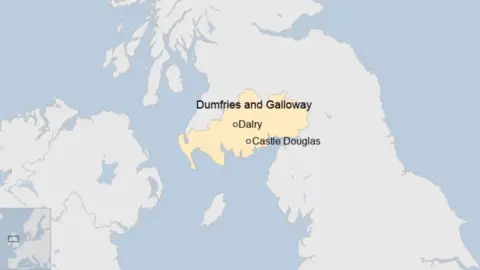Campaigners hope 'landmark decision' ends school mothballing
 BBC
BBCCampaigners have won a "landmark decision" they hope could stop some rural schools in Scotland being mothballed.
Dumfries and Galloway councillors voted unanimously to immediately halt the temporary closure of any secondary schools in the region.
It comes after parents at Dalry Secondary joined with community figures to fight the council's plans to shut the rural school.
Despite the decision on Thursday, uncertainty remains with members unable to agree how long the mothball suspension would last for in any future policy.
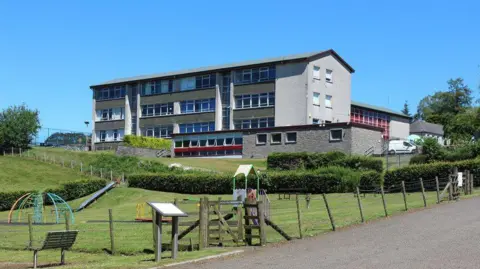 Graham Robson
Graham RobsonConcerned parents fighting for the Kirkcudbrightshire school's survival held a protest outside the council's building before the meeting to highlight their feelings.
Local Democratic Alliance councillor Dougie Campbell and the SNP's Andy McFarlane put forward the emergency motion to stop any "schools closures by stealth".
During a lengthy debate, members heard how the issues surrounding Dalry Secondary have rumbled on for more than 10 years.
It follows a contentious public consultation last year, after which stakeholders complained the authority did not present all of the options.
The consultation also highlighted that Dumfries and Galloway Council (DGC) has no formal policy for mothballing secondary schools.
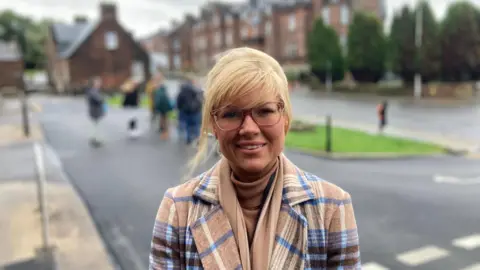
Emily Wall has two children and would face a 52-mile round trip to take them to Castle Douglas High School, if Dalry was to close.
Mrs Wall, the parent council's deputy chair, said it currently takes her children a 20-minute bus ride to get to school, but that would increase to about 90 minutes.
The 33-year-old said: "There is a real worry. We are one of the least populated places in the region, but the Glenkens is an upcoming area again.
"We have new investment from wind farms, and would like to see new people move into the area.
"But if the school is mothballed then I don't believe families would consider the Glenkens."
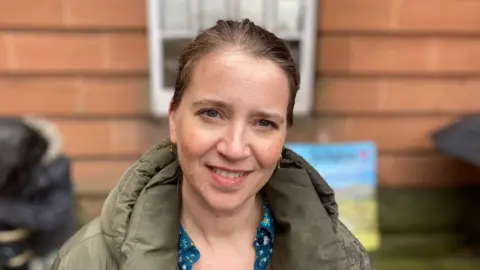
Sarah Ade said that parents, children and community figures made the journey to the council's offices "because the fear of mothballing our school is of huge importance".
The 46-year-old has two children at Dalry and is herself a former pupil.
She said: "We're not sure councillors from all over the region would really understand the relevance of it, and the closure may make sense on paper.
"So we came here to add the human element, so they can see us and speak to the people who would be heavily impacted by the recommendation to mothball."
Mrs Ade added there would be "huge ramifications" for the area without the school.

Stewart Gibson said Dalry Secondary was "at the heart of the community" and warned people would be forced to move out of the Glenkens area if it closed.
Mr Gibson, 46, said: "We still have 17 children at Dalry, after seeing an exodus of 10 children this year alone.
"We feel that's because there's been a managed decline of the school, with a reduction of subject choice leading to the pupil roll falling.
"Pre-Covid it was exceptional. So we want to see a complete reset, and to look at all the options available."
The father-of-one believed the moratorium was a "landmark decision".
And he hoped it would redresses how the mothballing process has been used by councils in rural areas.
Comparing south-west Scotland with other areas, he said: "The Highlands has a huge issue of depopulation, but councils have looked at new models.
"If the all-through model from nursery to S4 works in other parts of Scotland, then we can make it work in Dumfries and Galloway."
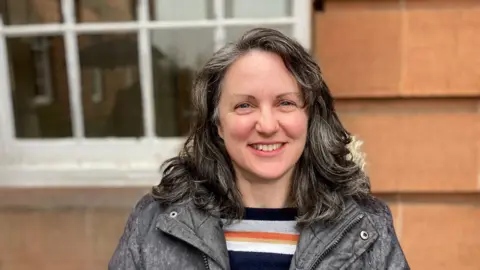
Michele Owen, chairwoman of Dalry Community Council, said local people were unhappy with how the school had been managed.
And the mother-of-one felt the council had "effectively forced" children to attend Castle Douglas instead.
The 49-year-old said: "The decision to mothball Dalry was thrown at us, and we're fighting to put a stop to it.
"We don't feel the council's procedure has been done with due care and consultation.
"Dalry is treated as a second-rate school and shouldn't be in partnership with Castle Douglas, Dalry needs its own head teacher and to be run independently again."

During Thursday's heated meeting, Conservative councillor David Inglis said the debate had overlooked the importance of the decision for the children.
He said: "I support the bulk of the motion because I hate to see the heart ripped out of a community when you take a school away."
DGC education officer Rachel Williams said she "completely applauds the community of Dalry for coming together, and councillors for being bold".
But she added falling pupil numbers were an issue and attendance figures of 85% were the lowest in the region.
Defending the council, Ms Williams said: "It's increasingly difficult to provide appropriate opportunities to address areas that need improvement.
"One of those was to improve the quality and consistency of teaching, by engaging pupils in activities that involves structured dialogue with their peers.
"To do that in a secondary school of such a small size is a real challenge."
Follow the BBC for the South of Scotland on X.
Listen to news for Dumfries and Galloway on BBC Sounds.
